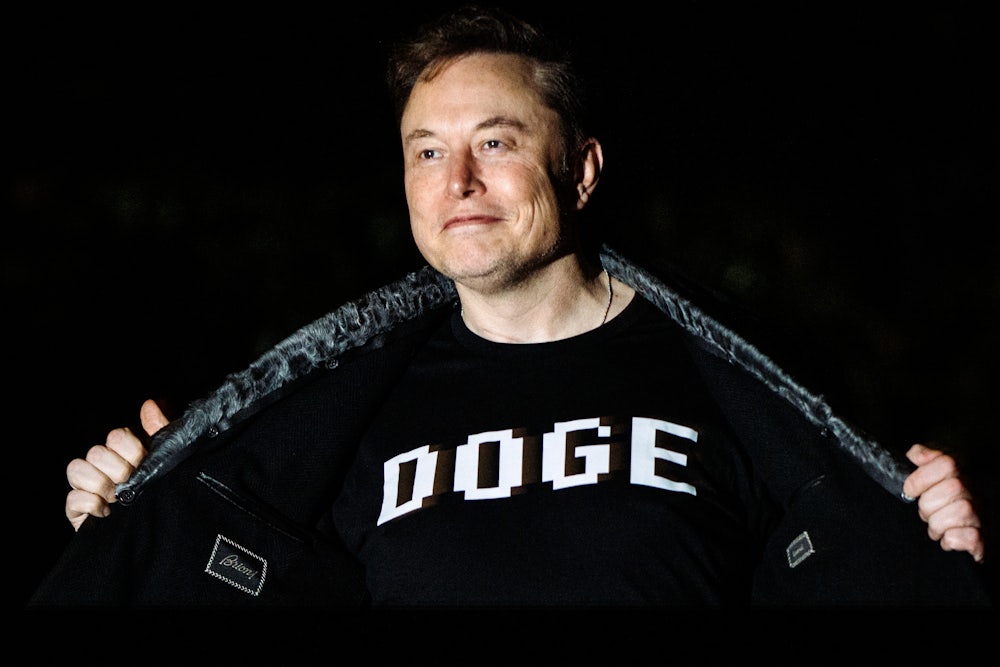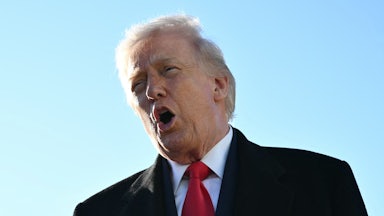Can one eulogize a federal agency that never existed? The question has the quality of a Zen riddle. But Reuters informs us that the phantasm known as the Department of Government Efficiency, a.k.a. DOGE, n’existe plus. “That doesn’t exist,” Office of Personnel Management, or OPM, Director Scott Kupor told Reuters’s Courney Rozen when Rozen inquired about DOGE’s status.
In fact, DOGE never existed—not as a government agency, anyway. Only Congress can create a government agency. Trump took a White House office called the U.S. Digital Service, fired a bunch of its employees, and renamed it DOGE. It operated as part of the White House Office of Management and Budget, whose director, Russell Vought, (as I explained in June) called most of the shots.
For an agency that never existed, DOGE did an impressive amount of damage. It shut down the U.S. Agency for International Development, eliminating or placing on administrative leave about 10,000 people. The consequence [of USAID’s elimination], according to advance estimates from the Boston University epidemiologist Brooke Nichols, will be the deaths of about 640,000 people, of whom about 430,000 are children.* Here’s a future efficiency statistic you won’t find on DOGE’s website: For every USAID worker fired, DOGE killed about 64 people.
DOGE also effectively shut down the Consumer Financial Protection Bureau, or CFPB, an obvious nuisance to an administration run by oligarchs, laying off most of its 1,700-person staff. Much of the heavy lifting here was done by Vought. President Donald Trump fired CFPB’s director, Rohit Chopra, and named Vought acting director. Now Vought is trying to shut off CFPB’s funding, using the argument that the Federal Reserve, which finances CFPB, cannot fund it because it’s operating at a loss. Never mind that the Fed is having no difficulties exercising its other duties.
As a result of DOGE’s and Vought’s effective shutdown of CFPB, Forbes’s Jeff Kauflin reported earlier this month, financial service companies are cutting budgets for consumer compliance, people with student loans are at greater risk that their payments won’t be recorded accurately, and the issuing of medical and retail credit cards that charge no interest up front—and heavy interest later—is on the rise. Raise your hand if you trust financial services companies not to screw consumers without regulatory oversight.
DOGE’s supposed North Star was taxpayer savings, but by that yardstick it was a dismal failure. Elon Musk, the billionaire ketamine fancier who ran DOGE through May as a time-limited special government employee, predicted up front that he could cut “at least $2 trillion” from the $7 trillion U.S. federal budget. Then he said $1 trillion. Then he said $150 billion. Today DOGE claims $214 billion in savings, but even if we accept that at face value (probably unwise), it doesn’t take into account the $135 billion that Max Stier, president of the Partnership for Public Service, estimated DOGE’s disruptions cost the government in lost productivity, paid leave, and the rehiring of workers fired mistakenly. Add in cuts to the IRS, which reduce rather than increase revenue, and DOGE’s cost rises to $458 billion. When you combine that with DOGE’s claim to have saved $214 billion, that nets out to an operating loss of $244 billion. Cutting waste, fraud, and abuse is very expensive!
OPM’s Kupor hit the roof after Rozen published her story saying DOGE had turned off the lights. Kupor posted very testily on X a non-denial denial—that is, a statement that purports to deny something but on closer examination does not. “The truth is,” Kupor wrote, “DOGE may not have a centralized leadership under [the U.S. DOGE Service]. But the principles of DOGE remain alive and well: de-regulation; eliminating fraud, waste, and abuse; re-shaping the federal workforce; making efficiency a first-class citizen; etc.” In other words: Yes, DOGE has been eliminated and its functions transferred elsewhere, which is exactly what the Reuters piece said.
Kupor’s fury at Reuters reflected apparent anxiety that if word got out that DOGE didn’t exist anymore, agency heads wouldn’t take DOGE-y directives from OPM very seriously. That’s a rational fear, because OPM has a history of not being taken seriously. Kupor’s X post linked to a memo he sent Friday requiring agency heads, in fulfillment of an October 15 executive order, to submit head counts to OPM and to create a Strategic Hiring Committee. It’s a venerable Washington fallacy that you can’t eliminate superfluous bureaucracy without first creating some other superfluous bureaucracy to identify where the original superfluous bureaucracy resides. On that, at least, MAGA is in complete accord with the deep state.
DOGE closed its doors at least eight months ahead of schedule. President Donald Trump initially intended to keep the thing going until July 4, 2026. But even Trump, Rozen reported, “often talks about DOGE in the past tense.” DOGE’s home page is another giveaway. It lists under “Latest work” a computer consolidation project at the General Services Administration that DOGE announced more than three months ago. Musk departed in May. Amy Gleason, who, to shield Musk from legal accountability, was named DOGE’s acting administrator, has been working at the Health and Human Services Department since early March. Steve Davis, a Musk lieutenant who was running DOGE on a day-to-day basis, tried to keep doing so after Musk left but got pushed out by the White House in June.
According to an excellent November 21 account by Sophia Cai and Daniel Lippman in Politico, the final death knell for DOGE came in late July when Mike Rigas, who’d served in a variety of high-level positions under Trump, was appointed acting administrator of the General Services Administration, or GSA. What power DOGE wielded derived from its having more or less taken over the GSA, which had been a weak host for an aggressive parasite. Rigas ended that. As of October, there were still 45 employees on DOGE’s payroll, but they’d lost their power. Now they’ve lost DOGE too, and are therefore significantly more superfluous than the workers they cut loose from government.
* This article originally mischaracterized Nichols’ findings.










